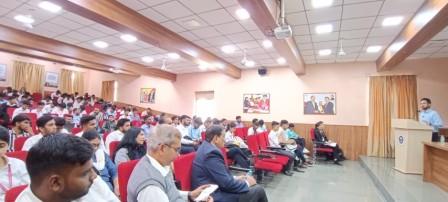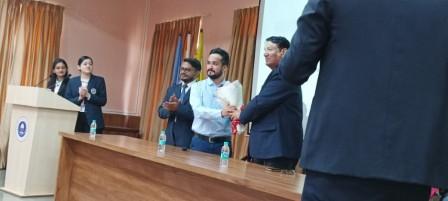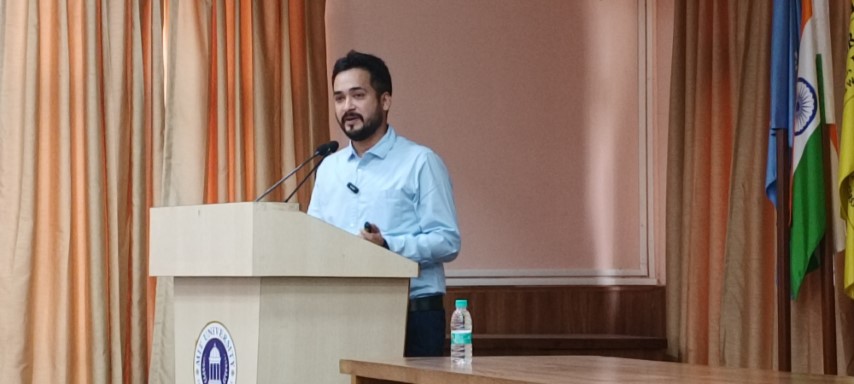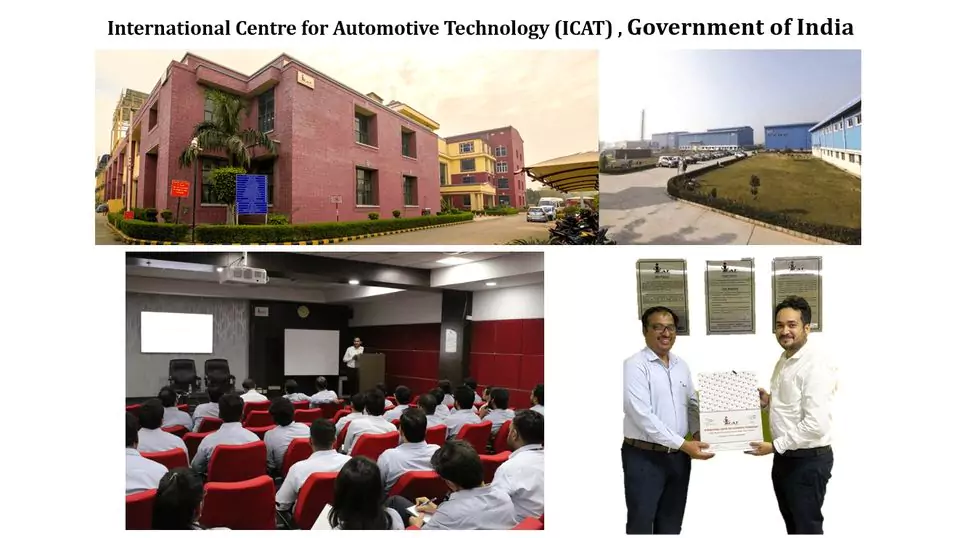IPR Workshop or Seminar on Patent: From Idea to granted Patent



- Glimpses of MITCOM organized a workshop on “How to patent an Idea: starting from an idea/invention to the grant of a patent”
- Speaker: Mr. Prasad Karhad, Founder and Director of Patent Attorney Worldwide Private Limited.
The outcome from this session / workshop on Patent
- Identify which ideas, inventions or projects can get patent
- Going from Idea to complete invention disclosure
- Taking informed and speedy actions to take that idea to a complete invention disclosure
- Moving ahead to a patent filed (patent pending) stage in shortest possible time
- Effectively managing procedure from filing to grant of patent
- Saving costs and time along the way by minimizing mistakes
- Getting grant of patent soon as possible
Session on Patents and Copyrights by Prasad Karhad at International Centre for Automotive Technology (ICAT) Government of India

- A highly engaging session on “Patents and Copyrights” at International Centre for Automotive Technology (ICAT) Government of India.
- The session was a great success, attended by brilliant engineers and senior management-level employees of the institute.
- We had an incredibly interactive session, answering over 70-80 questions from the enthusiastic audience.
The overall objective of this workshop was to Increase the Number of Patents By the institute and building wisdom and the right mindset about patents that will continuously help you to:
- Spot the opportunities to secure patents for your innovative ideas that are novel, inventive, and useful in your field of technology
- Identify the innovative ideas at the inception level and document them properly in the form of invention disclosures
- Take informed and speedy actions to file patent applications for your inventions in India and abroad, following the legal requirements and procedures
- Save costs and time along the way by minimizing mistakes and avoiding common pitfalls in the patent process
- Ultimately get benefits from your patented inventions not only with recognition, rewards or promotions but also by utilizing strategies to monetize them, such as licensing, selling, or producing them.
Online webinar, training with articles, videos, and online exam with certificate
it was an online “Complete video course on Patent in India for Teachers and Students “ by Prasad Karhad Founder and director at Patent attorney worldwide Pvt. Ltd. in which, more than 100 colleges participated in July-August 2020:
- College of Engineering Pune (COEP),
- AISSMS engineering,
- Koneru Lakshmaiah Education Foundation(Deemed to be University),
- Indian Institute of Technology Madras
- The Maharaja Sayajirao University of Baroda
- Sinhgad Institutes
- CHRIST (Deemed to be University) Bangalore
- Gandhi Institute of Technology & Management Visakhapatnam
- Ramaiah University of Applied Sciences
- IIT Roorkee
- Indian Institute of Technology (BHU) Varanasi
- Somaiya Vidyavihar University
- The Amity University
- Malaviya National Institute of Technology Jaipur.
- ABES Engineering College
- Indian Institute of Technology Bombay
- Institute of chemical technology, Mumbai
- GLA University
- University of pune
- Kumaraguru College of Technology
- Chaitanya Bharathi Institute Of Technology
- Lovely Professional University
- NIT Raipur
- Acharya Institutes, Bangalore
- Nirma University, Ahmedabad
- Dr. Babasaheb Ambedkar Marathwada University
- Integral University Lucknow
- IIT(ISM) Dhanbad
- IIT Bhubaneswar
- Bharati Vidyapeeth
- KL Deemed to be University
- G H Raisoni College of Engineering
- IIT Guwahati
- Aligarh Muslim University Aligarh
- National Institute of Electronics & Information Technology
- Osmania University
- National Institute of Technology Jamshedpur
- IIT Gandhinagar
- kiet.edu
- iith.ac.in
- bitmesra.ac.in
- nitte.edu.in
- sgbau.ac.in
- siu.edu.in
- vit.ac.in
- bharathuniv.ac.in
- iare.ac.in
- iiitd.ac.in
- mmumullana.org
- ptu.ac.in
- SRM Institute of Science and Technology
- Manipal University
- National Institute of Engineering
- etc…
Types of Sessions and workshops
| Code | Session Type | Duration | Topics Covered | Professional Fees |
|---|---|---|---|---|
| SN01 | Online session about IPR awareness | 2 hours | Patent, copyright, trademark, and design | ₹ 5,000 |
| SN02 | Online session about IPR in details | 6-8 hours (1 day) | Patent, copyright, trademark, and design | ₹ 10,000 |
| SN03 | Online session about From ideas to Patent grant | 3-4 hours | In-depth Intellectual Property Rights (IPR) workshop | ₹ 7,000 |
| SN04 | Online session about From ideas to Patent grant and Drafting of Patent application | 7-8 hours | Detailed session on ideas to Patent grant and Drafting | ₹ 15,000 |
| SN05 | Online session about IPR in details, From ideas to Patent grant and Drafting of Patent application | 14-16 hours (2 days) | Comprehensive session on IPR, Patent grant process, and Drafting | ₹ 25,000 |
| SN06 | Online session about Advance workshop on Patent Drafting (Patent writing) | 14-16 hours (2 days) | Advanced Patent Drafting | ₹ 30,000 |
For offline sessions conducted at the institute’s premises, the fees structure is as follows:
- The professional fees for the sessions will remain the same as outlined in the table for online sessions.
- In addition to the professional fees, the institute will bear the travel expenses and, if applicable, the accommodation charges for the session conductor.
For more details about our experts and experienced Patent attorneys profiles of our team, please visit our About Us page at https://patentattorneyworldwide.com/in/about-us/
Topics covered in an IPR sessions
Introduction to Intellectual Property Rights (IPR)
- Definition and Importance of IPR: Exploring the concept of IPR and its significance in academia and industry.
- Different Types of IPR and Their Significance: Understanding various IPR forms and their relevance.
Patents
- What is a Patent: Introduction to patents and their importance for inventors and researchers.
- Criteria for Patentability: Discussing the essentials like Novelty, Inventiveness (Non-obviousness), and Industrial application.
- Process of Filing a Patent: Outlining the steps from disclosure to grant, including provisional and complete specifications.
- Patent Search and Examination Process: Understanding how patents are searched and examined.
- Case Studies/Examples of Patents: Analyzing patents across different fields to illustrate practical applications.
Copyrights
- Definition and Scope of Copyright Protection: Explaining what copyright covers and its extent.
- Types of Works Protected by Copyright: Detailing the protections for literary, artistic, software, and other works.
- The Concept of Originality in Copyright: Discussing what constitutes originality in the context of copyright.
- Rights Granted Under Copyright Law and Limitations: Exploring the rights and fair use doctrine within copyright law.
- Copyright Registration Process and Enforcement: Understanding how copyrights are registered and enforced.
Trademarks
- What Constitutes a Trademark: Defining trademarks and their business importance.
- Trademark Registration Process and Concept of Distinctiveness: Explaining the registration process and the importance of distinctiveness.
- Trademark Infringement and Remedies: Outlining the consequences and remedies for trademark infringement.
- Examples of Well-Known Trademarks: Discussing well-known trademarks and their branding impact.
Designs
- Definition and Protection of Industrial Designs: Explaining the concept of industrial designs and their protection.
- Criteria for Design Registration: Discussing the requirements for design registration, focusing on novelty and originality.
- Process of Design Registration and Rights Conferred: Detailing the registration process and the rights obtained.
- Case Studies of Notable Design Protections: Analyzing notable examples of design protection to illustrate the concepts.
Topics covered in Idea to granted patent sessions
For a 2-4 hour patent session aimed at educational institutes, focusing on the journey from idea stage to creating an invention disclosure to the grant of a patent, several key topics should be covered. Here’s a structured approach to the session:
- Introduction to Patents and Intellectual Property Rights
- Definition and importance of patents in the academic and research context.
- Overview of different types of intellectual property (IP) and how they relate to patents.
- Idea Generation and Identification
- Techniques for brainstorming and identifying patentable ideas.
- Criteria for what constitutes a patentable idea (novelty, non-obviousness, utility).
- Invention Disclosure Process
- Steps to properly document and disclose an invention.
- Importance of maintaining confidentiality before filing a patent application.
- Role of invention disclosure forms in capturing key details of the invention.
- Patent Search and Prior Art Analysis
- How to conduct a preliminary patent search to identify existing patents and publications (prior art).
- Understanding the significance of prior art in determining the patentability of an invention.
- Patent Drafting and Filing
- Key components of a patent application: claims, description, drawings, abstract.
- The process of drafting a patent application that covers all aspects of the invention.
- Overview of provisional and non-provisional patent applications.
- Patent Prosecution and Grant Process
- Steps involved in the examination of a patent application.
- Responding to objections and office actions from the patent office.
- The timeline and stages from filing to the grant of a patent.
- Commercialization and Licensing of Patents
- Strategies for commercializing patents, including licensing and technology transfer.
- Importance of patents in collaboration, funding, and creating startup opportunities.
- Q&A and Interactive Discussion
- Open session for addressing specific queries of participants.
- Discussion on case studies or examples from the host institute’s domain of expertise.
Topics covered in Patent drafting – Patent writing sessions
A patent writing session for educational institutes spanning 4 to 8 hours typically covers various critical topics, aiming to provide a comprehensive understanding of the patent drafting process, including real-life examples. Here are the important topics generally covered in such a session:
- Introduction to Patents:
- Overview of intellectual property (IP) and the role of patents in protecting inventions.
- Differences between patents, copyrights, trademarks, and trade secrets.
- Patentability Criteria:
- Detailed explanation of what makes an invention patentable, focusing on novelty, inventive step (non-obviousness), and industrial applicability.
- Patent Search and Analysis:
- How to conduct a patent search to ensure the novelty of the invention.
- Analyzing search results to understand the state of the art and to refine the invention or patent application.
- Drafting a Patent Application:
- Step-by-step guidance on drafting a patent application, including the description, abstract, drawings, and claims.
- Tips on how to describe the invention clearly and completely to meet the legal requirements.
- Understanding Patent Claims:
- The importance of claims in a patent and how they define the scope and protection of the invention.
- Types of claims (independent and dependent claims) and strategies for drafting them effectively.
- Real-life Examples and Case Studies:
- Presentation of real-life examples and case studies to illustrate common challenges and best practices in patent drafting.
- Discussion on successful patents and analysis of why they were successful, possibly including patents from the educational sector.
- Common Mistakes and How to Avoid Them:
- Common pitfalls in patent writing and strategies to avoid them.
- Legal and technical aspects to be mindful of during the patent drafting process.
- Patent Prosecution Process:
- Overview of the process from patent filing to grant, including examination, responses to office actions, and eventual grant or rejection.
- Commercialization and Licensing:
- Understanding the commercial value of patents and how they can be licensed or sold to generate revenue.
- Strategies for patent portfolio management and leveraging patents for business and research development.
- Interactive Workshops and Practical Exercises:
- Hands-on exercises for drafting patent claims or sections of a patent application.
- Workshops or simulations to practice responding to patent office actions or conducting patent negotiations.
These sessions often conclude with a Q&A or interactive discussion, allowing participants to clarify doubts and discuss specific challenges they face in patent writing related to their field or institute.
